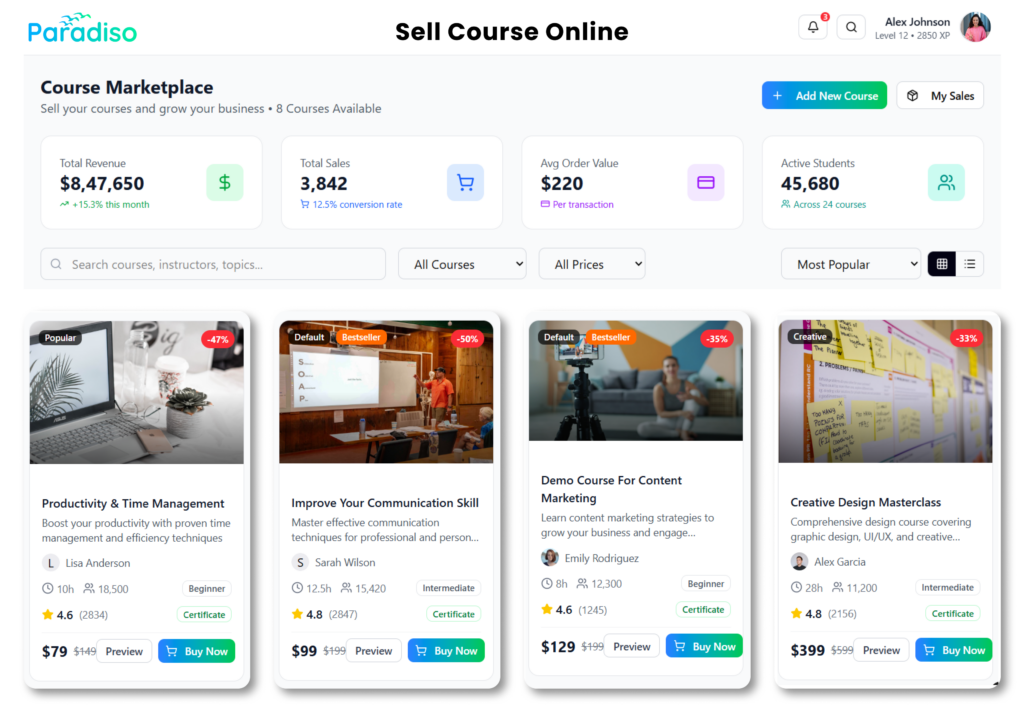In today’s fast-paced business landscape, channel partners play a crucial role in expanding a company’s reach and driving growth. However, their effectiveness heavily relies on the quality of training they receive. This blog series aims to guide businesses, both large enterprises and startups alike, on how to optimize their channel partner training programs with the power of technology, particularly the implementation of a robust LMS.
In this digital age, traditional training methods are rapidly becoming obsolete, while LMS platforms are revolutionizing the way organizations disseminate knowledge and empower their partners. By centralizing training materials, streamlining content delivery, and offering personalized learning experiences, an LMS unlocks a world of possibilities for enhancing partner performance. In this comprehensive series, we will navigate through the fundamental steps of designing a successful channel partner training program, examine the key features to look for in an LMS, and address the challenges that might arise during implementation.
Whether you are an LMS novice or already have experience with training management systems, this blog series will provide valuable insights and practical tips to ensure your channel partners are equipped with the knowledge and skills they need to thrive in the competitive marketplace.
What are channel partner training programs?
Channel partner training programs are structured educational initiatives designed to equip individuals or organizations, known as channel partners, with the necessary knowledge, skills, and resources to effectively represent and promote a company’s products or services.
These training programs aim to foster a deeper understanding of the company’s offerings, industry trends, sales techniques, and brand values among channel partners. By empowering partners with comprehensive training, businesses can strengthen their channel network, enhance product awareness, improve customer satisfaction, and ultimately drive revenue growth.
These programs are vital in ensuring that channel partners align their efforts with the company’s objectives and deliver a consistent and compelling brand experience to customers in diverse markets and regions.
Why channel partners are important?
Channel partners play a pivotal role in the success of a business by extending its market reach and driving sales growth. These partners, which can include distributors, resellers, dealers, or agents, act as intermediaries between the company and its target customers. Leveraging their existing networks, expertise, and local market knowledge, channel partners bring valuable insights and access to diverse customer segments that the company might not be able to reach directly.
By collaborating with channel partners, businesses can tap into new markets, reduce operational costs, and scale their business efficiently. Moreover, channel partners often offer specialized support and services, leading to improved customer satisfaction and loyalty, making them a crucial strategic asset for companies striving to stay competitive and expand their market share.
working with channel partners
Working with channel partners requires a strategic and collaborative approach to build strong and mutually beneficial relationships. First and foremost, businesses must carefully select partners whose values, expertise, and market presence align with their own goals. Open communication and transparency are essential in establishing trust and fostering a sense of partnership.
Providing comprehensive channel partner training through an LMS is vital to equip partners with the necessary product knowledge, sales skills, and brand messaging to effectively represent the company. Regular engagement, performance tracking, and incentive programs can further motivate partners to deliver exceptional results.
By fostering a symbiotic relationship, businesses can leverage the unique strengths of their channel partners to expand their market reach, penetrate new territories, and achieve sustainable growth together.
What is the benefit of training channel partners online?
Training channel partners online offer numerous benefits that can significantly enhance the effectiveness and efficiency of the training process:
- Global Reach: Reach partners worldwide, breaking geographical barriers and providing consistent training across different regions.
- Cost-Effective: Reduce training costs by eliminating the need for travel, accommodation, and physical training facilities.
- Flexibility: Offer self-paced learning, allowing partners to access training materials at their convenience, leading to better retention of information.
- Real-time Updates: Quickly update training content to reflect the latest product features, industry trends, or market changes.
- Performance Tracking: Monitor partner progress and performance through built-in analytics and reporting tools.
- Personalization: Tailor training content to meet individual partner needs and skill levels.
- Standardization: Ensure a consistent training experience, minimizing variations in knowledge and skill levels among partners.
- Scalability: Easily scale training programs to accommodate a growing partner network.
- Improved Engagement: Utilize interactive multimedia and gamification elements to boost partner engagement and motivation.
- Data-Driven Decision Making: Use data insights to optimize training strategies and identify areas for improvement.
- Faster Onboarding: Speed up partner onboarding, enabling them to start selling and promoting products sooner.
- Continuous Learning: Facilitate ongoing learning and skill development to keep partners up to date with industry developments.
What Problems Can Channel Partner Training Face, and How to Create a Strategy for Overcoming Them?
Channel partner training, like any training program, can encounter various challenges. Here are some common problems and strategies to overcome them:
Lack of Engagement:
Strategy: Create interactive and engaging content, such as videos, quizzes, and simulations, to keep partners interested.
Provide incentives and rewards for completing training milestones.
Limited Access to Training:
Strategy: Implement a cloud based LMS accessible from any device, ensuring partners can access training anytime, anywhere.
Consider offline training options for partners with limited internet connectivity.
Language and Cultural Barriers:
Strategy: Translate training materials into multiple languages to cater to diverse partner demographics.
Include culturally relevant examples and case studies to enhance understanding.
Training Content Relevance:
Strategy: Conduct needs assessments and gather feedback from partners to ensure training content aligns with their specific needs.
Regularly update content to reflect changes in products, industry trends, and customer demands.
Time Constraints:
Strategy: Offer flexible, self-paced training modules that fit partners’ busy schedules.
Break training content into bite-sized modules for easy consumption.
Resistance to Change:
Strategy: Communicate the benefits of online training clearly and emphasize how it will improve partners’ performance and success.
Provide support and encouragement during the transition to online training.
Tracking and Accountability:
Strategy: Use the LMS’s analytics and reporting features to monitor partner progress and performance.
Set clear expectations and goals for training completion and performance metrics.
Limited Technical Skills:
Strategy: Offer user-friendly LMS interfaces and provide training sessions to familiarize partners with the platform.
Provide ongoing technical support and resources.
Competition with Other Activities:
Strategy: highlight the importance of training in achieving business goals and partner success.
Offer incentives or rewards for high-performing partners to motivate them to prioritize training.
Onboarding Challenges:
Strategy: Develop a structured onboarding program that introduces new partners to the company, products, and training resources.
Assign mentors or coaches to guide new partners through the initial training phase.
How to Choose a Channel Partner LMS?
Choosing the right Learning Management System (LMS) for channel partner training is crucial for the success of your training program. Consider the following factors when making your decision:
- Compatibility and Integration:
Ensure the LMS can integrate seamlessly with your existing systems, such as CRM and ERP platforms, to streamline data flow and reporting.
- Scalability:
Choose an LMS that can grow with your business and accommodate an expanding partner network without compromising performance.
- User-Friendly Interface:
opt for an LMS with an intuitive and easy-to-navigate interface to facilitate partner adoption and engagement.
- Mobile-Friendly:
Select an LMS that supports mobile devices, enabling partners to access training on smartphones and tablets for on-the-go learning.
- Multilingual Support:
If your partner network spans across different regions, ensure the LMS supports multiple languages to cater to diverse audiences.
- Content Management and Customization:
Look for an LMS that allows easy content uploading, updates, and customization to tailor training to your specific needs.
- Reporting and Analytics:
Prioritize an LMS with robust reporting capabilities, offering detailed insights into partner performance, progress, and training effectiveness.
- Security and Compliance:
Ensure the LMS adheres to industry-standard security protocols and data privacy regulations, especially if dealing with sensitive information.
- Support and Training:
Assess the level of technical support, training, and resources provided by the LMS vendor to ensure a smooth implementation and ongoing assistance.
- Gamification and Engagement Features:
Consider LMS platforms that incorporate gamification elements, badges, leaderboards, or rewards to boost partner motivation and participation.
- Trial and Demo Period:
Take advantage of trial or demo periods to test the LMS and gauge its suitability for your channel partner training needs.
- Cost and Pricing Model:
Compare pricing plans and consider both upfront costs and ongoing subscription fees to align with your budget and expected return on investment.
- Customer Reviews and Reputation:
Research user reviews and testimonials to gain insights into LMS’s performance and customer satisfaction.

Why Use an LMS for Channel partner training?
Using a Learning Management System (LMS) offers numerous benefits for organizations and learners alike. An LMS provides a centralized platform to create, deliver, manage, and track training content, making it an efficient and scalable solution for workforce development, employee onboarding, and channel partner training.
With an LMS, businesses can offer flexible and personalized learning experiences, foster continuous skill development, and monitor learner progress through analytics and reporting. By streamlining training processes, reducing costs, and ensuring consistent knowledge transfer, an LMS empowers organizations to stay competitive in a rapidly evolving digital landscape while maximizing the potential of their workforce and partners.
5 Best Channel Partner LMS in 2023
- Paradiso LMS
- LearnUpon LMS
- Docebo LMS
- Absorb LMS
- Talent LMS
Paradiso LMS
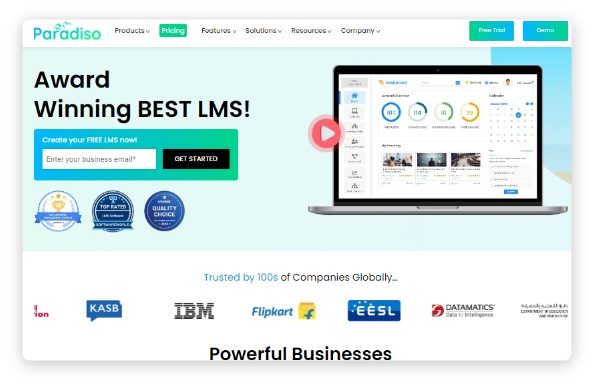
Paradiso LMS is an excellent choice for companies seeking an intuitive and engaging platform to enhance their channel partner training experiences. With its multilingual support, organizations can easily deliver training content in different languages, catering to a diverse global partner network. The incorporation of gamification features such as badges, points, and leaderboards incentivize and motivates channel partners, making learning enjoyable and effective.
Moreover, Paradiso LMS allows companies to personalize the platform with their branding elements, maintaining a consistent brand experience throughout the training process.
LearnUpon LMS
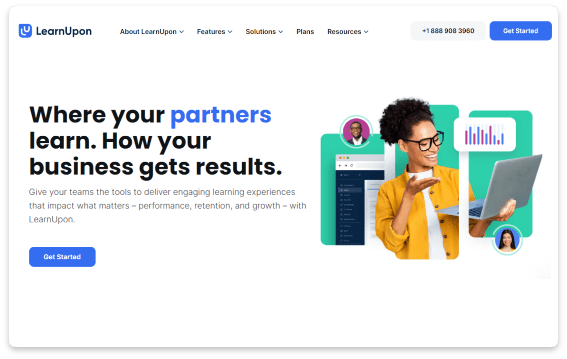
Docebo LMS
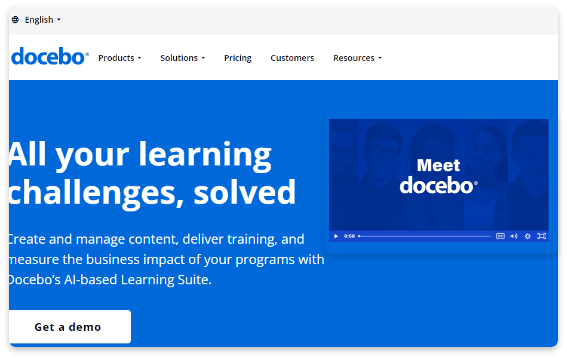
Docebo LMS stands out by leveraging AI-powered learning to create a dynamic and flexible training experience for channel partners. With personalized course recommendations and content based on individual preferences and performance, partners receive a tailored learning journey. The seamless mobile app integration further enhances accessibility and flexibility, allowing partners to access training materials anytime, anywhere.
Organizations can create adaptive learning paths, catering to the unique needs and goals of each channel partner, ultimately boosting the effectiveness of training initiatives.
Absorb LMS
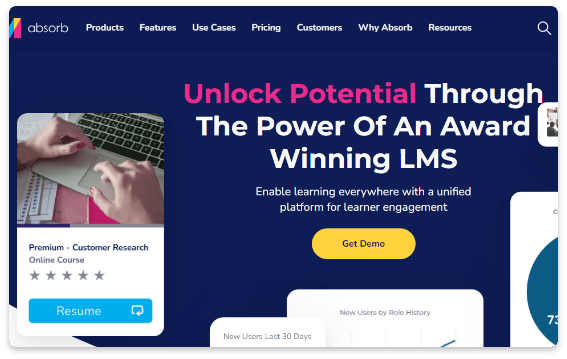
Absorb LMS excels in scalability, making it an ideal choice for companies with expanding partner networks. As the organization grows, Absorb LMS can effortlessly accommodate the increased demand for training without compromising on performance or user experience. The platform’s user-friendly interface and personalized learning paths contribute to a seamless learning experience for channel partners.
Moreover, Absorb LMS offers robust compliance training features, ensuring partners are up to date with industry regulations and standards.
Talent LMS

Talent LMS is a top pick for organizations seeking a quick and cost-effective solution for training and managing their channel partners. With easy setup and deployment, companies can swiftly launch their partner training programs, saving time and resources.
The built-in e-commerce functionality enables organizations to monetize their training programs by selling courses and certifications to external partners or customers, offering an additional revenue stream. Overall, TalentLMS simplifies the process of training and managing channel partners while remaining budget friendly.
Why Choose Paradiso LMS?
Choosing Paradiso LMS for your channel partner training needs is a decision that promises exceptional results. With its intuitive user interface and multilingual support, Paradiso LMS ensures a seamless and engaging learning experience for partners across the globe. The platform’s gamification features foster motivation and interaction, making training enjoyable and effective.
Paradiso LMS also stands out with its robust analytics and reporting tools, providing valuable insights into partner performance and training effectiveness. With seamless integration options, excellent customer support, and a strong focus on security and compliance, Paradiso LMS is the go-to solution for businesses seeking a feature-rich, user-friendly, and globally accessible platform for channel partner training.













